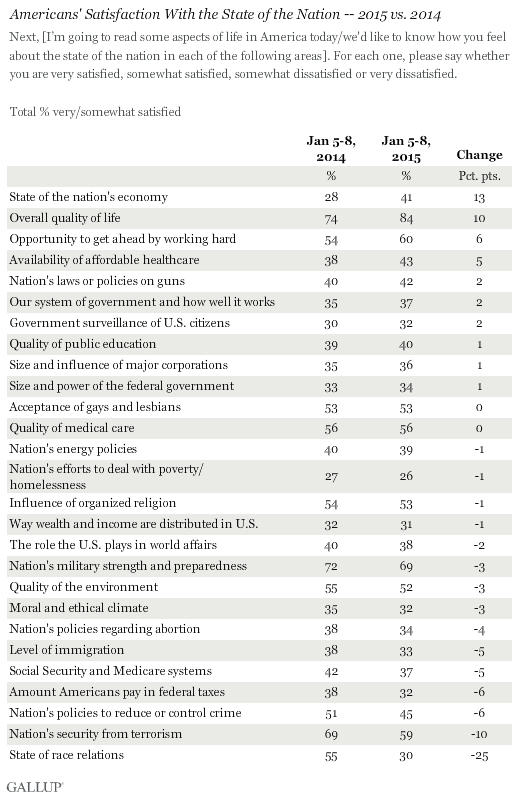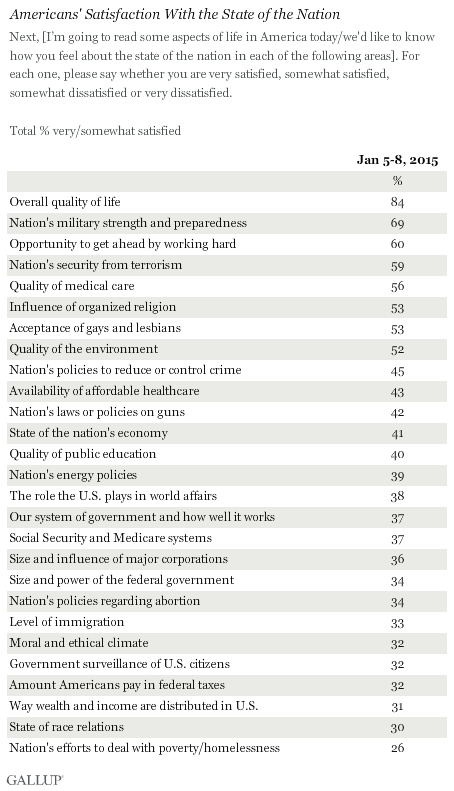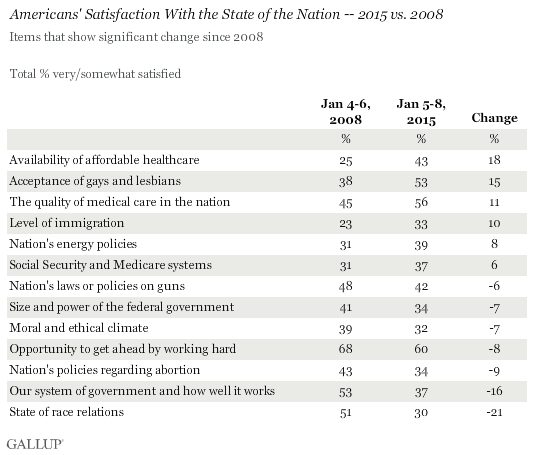Story Highlights
- Satisfaction with race relations down 25 points to a mere 30%
- Satisfaction with the economy up 13 points in past year, to 41%
- Security from terrorism dips 10 points, but still high at 59%
PRINCETON, N.J. -- Americans' views about the economy, their overall quality of life and the opportunity to get ahead through hard work are more positive than they were before the 2014 State of the Union Address -- echoing their improving economic confidence. At the same time, Americans are markedly less satisfied with the state of race relations and, to a lesser extent, with the nation's security from terrorism, with crime and with federal taxes.

These are the significant changes in how Americans see the country at the start of 2015 compared with the same point in 2014, according to Gallup's annual Mood of the Nation poll. This year's update was conducted Jan. 5-8, spanning the Jan. 7 terrorist attack on the headquarters of French newspaper Charlie Hebdo in Paris that took 12 lives and immediately consumed U.S. and world news headlines.
Americans' ratings of the remaining aspects of the country in the poll are largely unchanged, including such widely debated areas as education, the level of immigration, healthcare and the nation's energy policies.
Quality of Life, Military, Economic Opportunity Lead 2015 List
Apart from the changes in the past year, Americans are most satisfied with the overall quality of life in the country. Eighty-four percent are satisfied with this aspect of the nation, including 30% very satisfied and 54% somewhat satisfied. This eclipses the nation's military strength and preparedness, which earns a 69% satisfaction score. Meanwhile, 59% of Americans remain satisfied with the nation's security from terrorism, keeping this in the top five despite a 10-point decline since 2014.
Other issues about which at least half of Americans are satisfied include the opportunity to get ahead by working hard (60%), the quality of medical care (56%), the influence of organized religion (53%), the acceptance of gays and lesbians (53%) and the quality of the environment (52%).

The rise in Americans' satisfaction with the nation's economy to 41% puts the issue at about the middle of the group of 27 areas rated this year, up from the bottom of the pack last year. At the same time, the downturn to 30% in satisfaction with race relations has moved it from the middle of the list to near the bottom, just slightly ahead of the nation's efforts to deal with poverty (26%). Other issues on which no more than a third of Americans are satisfied are immigration (33%), the moral and ethical climate (32%), government surveillance of U.S. citizens (32%), federal taxes (32%) and the way wealth and income are distributed (31%).
Progress and Setbacks Since 2008
Yet another way to look at the 2015 results is how they compare with January 2008 -- the last Gallup reading of these measures before Barack Obama took office (the questions weren't asked in early 2009). On that basis, satisfaction is up on six items, led by the availability of affordable healthcare, acceptance of gays and lesbians, the quality of medical care and the level of immigration -- all areas where Democrats' satisfaction has surged and independents' has increased, while Republicans' has waned or not changed.
Over the same period, satisfaction is down in seven areas -- most sharply on race relations, where it has fallen among all party groups, and the U.S. system of government and how well it works, down mainly among Republicans.
The economy is not on this list of issues that have seen major change since January 2008 because economic confidence did not become deeply negative until later in 2008.

Bottom Line
When Americans settle in to watch Obama deliver his State of the Union address Tuesday night, they will do so feeling better about the economy than a year ago -- though still not as content about it as they could be, given that satisfaction stands at 41%. That provides Obama with an opportunity to tout his successes while still asking Congress to support additional economic measures. It also frees him to make proposals that may have seemed extravagant at the height of the recession, such as his plan to subsidize tuition at community colleges for students who meet certain conditions.
Race relations, which elicited high mentions on Gallup's Most Important Problem list in December, has the compound challenge of suffering the sharpest decline in public satisfaction since 2014 and ranking among the lowest issues tested -- thus making it a prime topic for the president's attention.
With Obama edging closer to the end of his presidency, he may be speaking as much to the future as to the members of Congress sitting before him. In reviewing his achievements, economic progress is likely to be front and center, but he may also highlight the three issues on which public satisfaction -- and particularly Democrats' satisfaction -- has increased the most since 2008: healthcare, gay rights, and immigration.
Survey Methods
Results for this Gallup poll are based on telephone interviews conducted Jan. 5-8, 2015, with a random sample of 804 adults, aged 18 and older, living in all 50 U.S. states and the District of Columbia. For results based on the total sample of national adults, the margin of sampling error is ±4 percentage points at the 95% confidence level. All reported margins of sampling error include computed design effects for weighting.
Each sample of national adults includes a minimum quota of 50% cellphone respondents and 50% landline respondents, with additional minimum quotas by time zone within region. Landline and cellular telephone numbers are selected using random-digit-dial methods.
View survey methodology, complete question responses, and trends.
Learn more about how Gallup Poll Social Series works.

